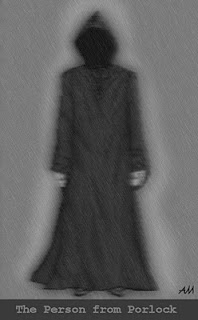The original Person from Porlock called on the poet Samuel Taylor Coleridge one evening in 1797 while the latter was frantically writing down Kubla Khan
There are many conspiracy theories associated with the Person from Porlock, but perhaps the most grandiose of all is presented by Raymond F. Jones in his short story "The Person from Porlock", first published in Astounding Science Fiction in August 1947. The hero of this story is a scientist who becomes obsessively convinced that an organization he refers to as the "Persons from Porlock" is conspiring to prevent him completing his work. Not surprisingly, this is dismissed as paranoia by his colleagues... but by the end of the story, he is proved right. The "Persons from Porlock" turn out to be human-looking aliens in our midst, who will go to any lengths to keep their existence secret!
The aliens even provide a convincing explanation for the original Person from Porlock: "It was one of [our] colonies which the drugged mind of your poet, Coleridge, was able to see in his unconsciousness, and which he began to describe in 'Kubla Khan'. My people had detected the presence of his perceptions and one of them was sent immediately to interrupt the work of his recollection, because they didn't want their colony revealed with such accurate description as Coleridge could make. The Person from Porlock was this disturbing emissary."

1 comment:
Damn those guys! My PhD thesis would have been awesomely better without them!
Post a Comment